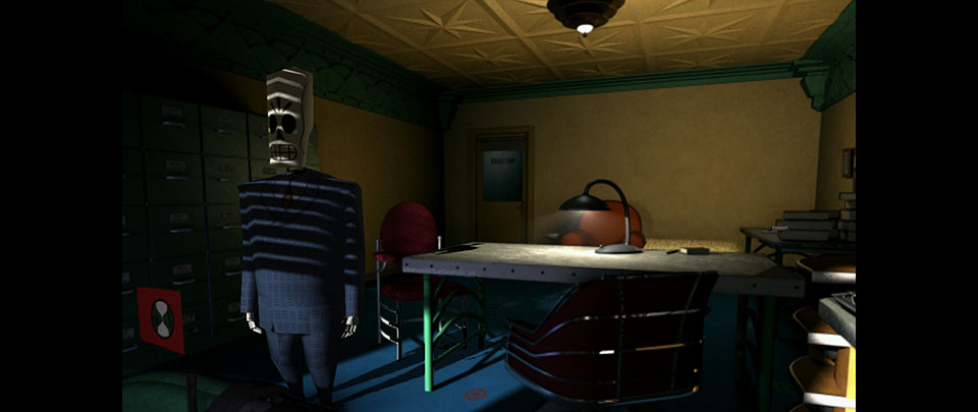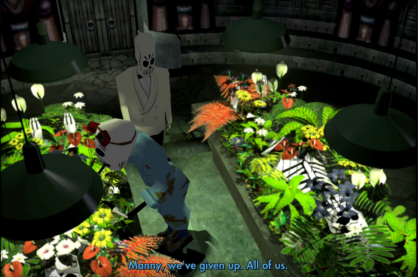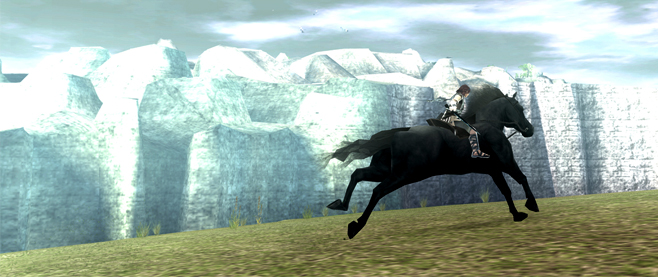
Grim Fandango and Notions of a Working-Class Underworld
Manuel Calavera, an agent of the Department of Death, has been in the Eighth Underworld for so long that the Land of the Living is entirely alien to him. Unlike the three-dimensional calacas that make up Grim Fandango’s world, the Land of the Living is made up of two-dimensional collages of colored paper and decoration, loud discordant sounds, and unreadable faces. By all accounts, the Land of the Dead should be as alien to us as our world is to the long-dead Manny.
However, in spite of its fantastical Day of the Dead inspired world, Grim Fandango suggests that an underworld will be rife with the same foibles that face our world: grand inequality, criminal conspiracies, sub-par Beat poets, and the average person left floundering in meaningless employment.
The four-year journey towards whatever comes next is interrupted by prolonged periods in which Manuel simply works jobs. When he arrives in the seaside city of Rubacava, he takes up a position managing a diner, and spends a year upgrading it into a ritzy nightclub. By all accounts, the transition is a capitalist ideal, a rags-to-riches story. To Manuel, though, it is only a means to an end. To him, money should have no worth in the afterlife. The labor becomes as banal as any other job.
Manuel’s status as the protagonist permits him this grand redemptive journey, but many of Grim Fandango’s most memorable side characters resonate specifically because they have simply allowed their afterlife to pass them by in menial jobs. A coroner in Rubacava, who identifies victims of “sprouting” – the closest analogue to death in the Underworld, communicates to Manny that he has lost faith in any place beyond their skeletal mimic of our own. He’s not the only one – “we’ve given up,” he tells Manny: “All of us.”
Even Manny’s position at the Department of Death has been reduced to a wage gig. Despite the administrative, governmental name, the job of the Reapers is entrenched in the language of sales: Manny, classified as a travel agent, offers his clients benefits packages and upgrades and complimentary knick-knacks even as he is telling them that they are damned to a four-year walk to whatever comes next, only to be punished by his boss for not making a large enough sale. Death is often perceived as a great equalizer, but Grim Fandango suggests that death itself is propelled by inequality. We are left to wonder how many of the people that Manuel encounters have lost hope specifically because the rampant corruption in the Department of Death has robbed them of the hope to move towards something better.

To make matters worse, Manny’s position is not voluntary. Flavor text within the game suggests that Manuel is working off a karmic debt, the details of which are never made clear beyond the terms of the arrangement: he will only be permitted to move on when he has made enough “sales” of a high enough value. While we’re never told the nature of Manuel’s life in the Land of the Living, it is compelling to note that this penance does not necessitate spiritual growth or any sort of repentance. Instead, his labor – and capacity to bring in capital – is conceptualized by the powers that be as a worthy substitute.
The ascetic journey of those unworthy of the tickets for a fast-pass to what comes next is invalidated when capital is incorporated into it. The working-class dead – whether they were rich or poor in life is irrelevant – are almost required to stagnate in a gross imitation of our own economic system in order to scrounge together opportunities for progress. The Eighth Underworld is not a land of defined paths but demonic forests, destructive seas, and steep peaks, inhabited by monsters entirely willing to destroy the skeletal forms of the dead. When death is still possible in the Underworld, moral stillness becomes the pragmatic option.
All of these factors compound to make what should be a transitory realm hauntingly static: a purgatory in Capitalist clothing in which the working-class are held hostage via the machinations of a corrupt institution that has sold out.
Of course, Manny Calavera’s story contributes to a more just Underworld – his part in dismantling the scheme to rob the just of their spiritual progression may create lasting change. However, there is something innately critical, perhaps even Marxist, in the fact that the game has manifested a world where such a scheme was possible: the calacas of Grim Fandango are navigating an afterlife where dishonesty and systemic manipulation allows one to build a disturbing amount of wealth and influence, to use positions of power to rob and steal from those less privileged, even to profit from the enslavement and suffering of the marginalized. The average soul remains largely ignorant to these plots and condemned to stagnation under the misconception of fairness. The powers that be seem content to sit by and watch, despite the supposed meritocracy of the entire system. “The Gate [to the next world] does not help,” its keeper tells us, unwilling to intervene even when faced with evidence of injustice on a grand scale. Change is only manifested via the actions of those most desperate for it.
Manny’s efforts to find Meche Colomar, the narrative heart of the game, has the side-effect of pushing him to support the arts, to encourage a budding labor union, and to assist a league of working-class, stagnant skeletons all across the underworld – the final moments of the game are not of a singular moral victory, but of one born of collective desire for hope and change that builds towards class solidarity. The Number Nine Express does not carry him alone – and neither can the Eighth Underworld.
———
Joshua M. Henson has been playing video games since Doom II at the age of four, and hasn’t shut up about them since. You can find him on twitter posting very occasionally.





